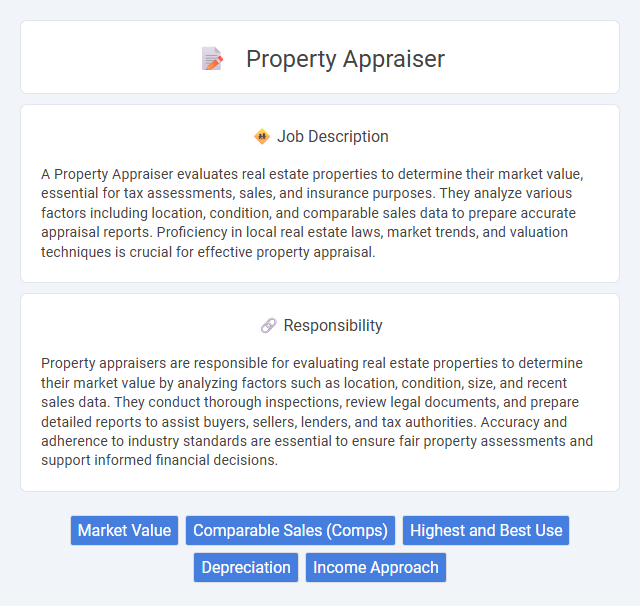
A Property Appraiser evaluates real estate properties to determine their market value, essential for tax assessments, sales, and insurance purposes. They analyze various factors including location, condition, and comparable sales data to prepare accurate appraisal reports. Proficiency in local real estate laws, market trends, and valuation techniques is crucial for effective property appraisal.
Individuals with strong analytical skills and attention to detail are likely to excel as property appraisers. Those comfortable with numbers, real estate regulations, and conducting thorough inspections may find this role suitable. People who prefer independent work and can handle occasional field visits might have a higher probability of success in this profession.
Qualification
A Property Appraiser must hold a state-issued certification or license, typically requiring a bachelor's degree in finance, real estate, or a related field along with specialized training in property valuation. Proficiency in using appraisal software and understanding local real estate markets, zoning laws, and taxation regulations is essential for accurate property assessments. Strong analytical skills, attention to detail, and effective communication abilities are critical to delivering reliable appraisals that support mortgage lending, taxation, and investment decisions.
Responsibility
Property appraisers are responsible for evaluating real estate properties to determine their market value by analyzing factors such as location, condition, size, and recent sales data. They conduct thorough inspections, review legal documents, and prepare detailed reports to assist buyers, sellers, lenders, and tax authorities. Accuracy and adherence to industry standards are essential to ensure fair property assessments and support informed financial decisions.
Benefit
A Property Appraiser likely benefits from a stable demand due to the consistent need for accurate property valuations in real estate, taxation, and lending industries. The role probably offers opportunities for professional growth and specialization, enhancing earning potential and career advancement. Flexible work environments and the possibility of fieldwork may also contribute to a balanced work-life experience.
Challenge
The Property Appraiser job likely involves complex challenges related to accurately assessing property values amid fluctuating market conditions and diverse property types. It probably requires thorough knowledge of local real estate trends, zoning laws, and economic factors to produce reliable appraisals. Navigating these variables might demand strong analytical skills and adaptability to ensure fair and consistent property evaluations.
Career Advancement
A Property Appraiser evaluates real estate to determine market value, essential for taxation, sales, and financing decisions. Career advancement can lead to senior appraiser roles, supervisory positions, or specialization in commercial, residential, or industrial properties. Earning certifications like the Certified Residential Appraiser (CRA) or Certified General Appraiser (CGA) enhances professional credibility and opens opportunities for higher pay and leadership.
Key Terms
Market Value
Property appraisers specialize in determining the market value of real estate by analyzing recent sales, property conditions, and local market trends. Accurate market value assessments are essential for tax purposes, lending decisions, and real estate transactions. These professionals use advanced appraisal methods and data analytics to ensure valuations reflect current market conditions and property characteristics.
Comparable Sales (Comps)
A Property Appraiser specializes in analyzing Comparable Sales (Comps) to determine accurate market values for residential and commercial properties. They gather data from recent property transactions with similar characteristics, adjusting for differences in size, location, and condition to estimate a fair market price. Expertise in interpreting comps ensures precise valuations that support real estate transactions, tax assessments, and lending decisions.
Highest and Best Use
Property appraisers analyze real estate to determine its highest and best use, maximizing value based on zoning, land use regulations, and market demand. They evaluate physical, legal, and financial attributes to recommend optimal property utilization, ensuring feasible, legally permissible, and financially productive outcomes. This analysis supports investment decisions, land development, and appraisal accuracy in real estate markets.
Depreciation
Property appraisers evaluate the value of real estate by analyzing factors such as location, market trends, and physical condition. Depreciation plays a crucial role in their assessments, as it accounts for the loss of property value due to aging, wear and tear, or obsolescence. Accurate calculation of depreciation ensures precise valuation for taxation, insurance, and sales purposes.
Income Approach
Property appraisers specializing in the Income Approach analyze the present value of future cash flows generated by income-producing properties. They evaluate rental income, operating expenses, vacancy rates, and capitalization rates to estimate market value accurately. Mastery of income capitalization and discounted cash flow models ensures precise appraisals for investment decisions and financing.
 kuljobs.com
kuljobs.com